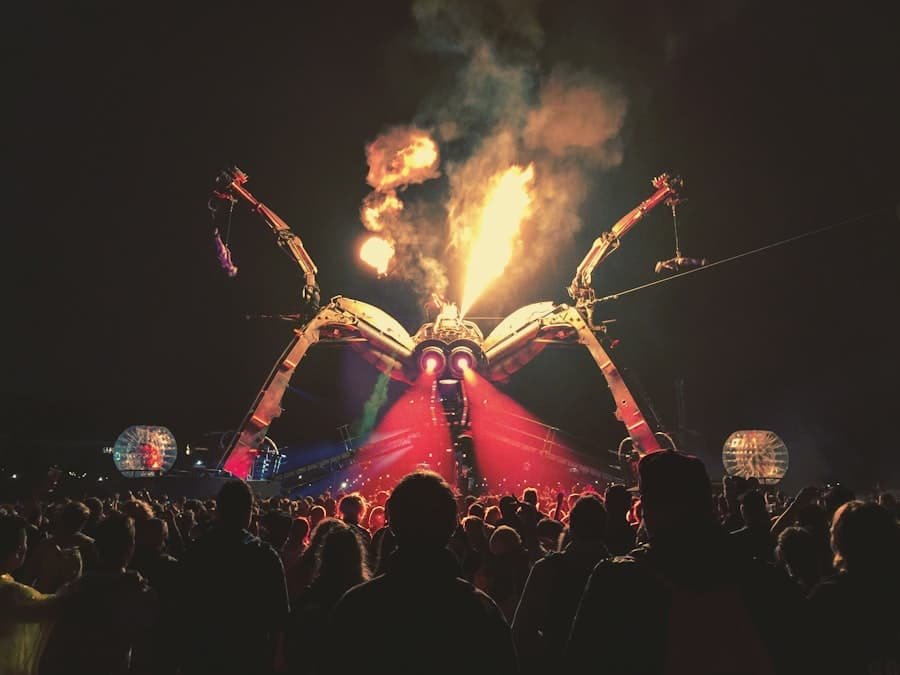The integration of artificial intelligence (AI) into the entertainment industry has ushered in a transformative era, reshaping how content is created, distributed, and consumed. From music and film to gaming and marketing, AI technologies are not merely tools; they are becoming co-creators, influencing artistic expression and audience engagement in unprecedented ways. The rapid advancement of machine learning algorithms, natural language processing, and data analytics has enabled creators to push the boundaries of their craft, leading to innovative experiences that were once the realm of science fiction.
As AI continues to evolve, its applications within entertainment are becoming increasingly sophisticated. For instance, AI can analyse vast amounts of data to predict trends, tailor content to individual preferences, and even generate original works. This capability not only enhances the creative process but also allows for a more personalised experience for audiences.
The implications of these developments are profound, raising questions about authorship, creativity, and the very nature of entertainment itself. As we delve deeper into the various facets of AI in entertainment, it becomes clear that this technology is not just a passing trend but a fundamental shift in how we engage with art and media.
Summary
- AI is revolutionizing the entertainment industry by enhancing creativity, personalization, and audience engagement.
- AI in music and composition is enabling artists to explore new sounds and styles, and creating music tailored to individual preferences.
- AI is transforming film and television production by streamlining processes, enhancing visual effects, and improving audience experiences.
- In gaming and virtual reality, AI is creating immersive and interactive experiences, and enabling realistic simulations and intelligent gameplay.
- AI is driving content recommendation and personalization, delivering tailored entertainment experiences and improving user engagement.
AI in Music and Composition
The music industry has witnessed a remarkable transformation with the advent of AI technologies. Algorithms can now compose original pieces of music, analyse existing songs for patterns, and even assist artists in the creative process. For example, platforms like AIVA (Artificial Intelligence Virtual Artist) utilise deep learning to create compositions that range from classical symphonies to contemporary pop tracks.
These AI-generated pieces can serve as inspiration for human musicians or be used directly in various media projects, showcasing the potential for collaboration between man and machine. Moreover, AI’s ability to analyse listener preferences has revolutionised how music is marketed and distributed. Services like Spotify employ machine learning algorithms to curate personalised playlists based on user behaviour and listening history.
This not only enhances user experience but also helps emerging artists reach their target audience more effectively. By understanding what resonates with listeners, AI can guide musicians in their creative choices, leading to a more tailored approach to music production that aligns with current trends and audience desires.
AI in Film and Television Production

In the realm of film and television, AI is making significant strides in various stages of production. From scriptwriting to post-production editing, AI tools are streamlining processes that were once labor-intensive. For instance, companies like ScriptBook have developed AI systems capable of analysing scripts for their potential success at the box office by evaluating elements such as character development, plot structure, and dialogue.
This data-driven approach allows producers to make informed decisions about which projects to greenlight, potentially reducing financial risks associated with film production. Additionally, AI is enhancing visual effects and animation through advanced algorithms that can generate realistic imagery and simulate complex environments. The use of AI in post-production has also improved efficiency; tools like Adobe’s Sensei leverage machine learning to automate tedious tasks such as colour correction and sound editing.
This not only saves time but also allows creative professionals to focus on the artistic aspects of their work rather than getting bogged down by technical details. As a result, the quality of visual storytelling is elevated, providing audiences with more immersive experiences.
AI in Gaming and Virtual Reality
The gaming industry stands at the forefront of AI innovation, where it plays a crucial role in creating dynamic and engaging experiences for players. AI algorithms are employed to develop non-player characters (NPCs) that exhibit realistic behaviours and adapt to player actions, enhancing the overall gameplay experience. For instance, games like “The Last of Us Part II” utilise sophisticated AI systems that allow NPCs to react intelligently to players’ decisions, creating a more immersive narrative environment.
Furthermore, AI is instrumental in the development of virtual reality (VR) experiences. By analysing user interactions within VR environments, AI can tailor experiences to individual preferences, making them more engaging and personalised. This adaptability is particularly valuable in educational or training simulations where user engagement is critical for effective learning outcomes.
As VR technology continues to advance, the integration of AI will likely lead to even more sophisticated simulations that blur the lines between reality and virtual experiences.
AI in Content Recommendation and Personalization
One of the most significant impacts of AI in entertainment is its ability to enhance content recommendation systems. Streaming platforms like Netflix and Amazon Prime Video rely heavily on machine learning algorithms to analyse user behaviour and preferences, allowing them to suggest content that aligns with individual tastes. These systems consider various factors such as viewing history, genre preferences, and even the time of day when making recommendations.
This level of personalisation not only improves user satisfaction but also increases viewer retention rates for these platforms. Moreover, AI-driven recommendation engines are not limited to streaming services; they extend to social media platforms and news aggregators as well. For instance, YouTube employs complex algorithms that analyse user interactions—such as likes, shares, and watch time—to curate a personalised feed of videos.
This targeted approach ensures that users are continually engaged with content that resonates with them, fostering a deeper connection between audiences and creators. As these systems become more refined, they will likely play an even more significant role in shaping how we discover and consume entertainment.
AI in Marketing and Audience Engagement

The marketing landscape within the entertainment industry has been significantly transformed by AI technologies that enable more effective audience engagement strategies. By leveraging data analytics and machine learning, marketers can gain insights into consumer behaviour patterns, allowing them to tailor campaigns that resonate with specific demographics. For example, predictive analytics can identify potential audience segments for a new film or album release based on historical data from similar projects.
Additionally, AI chatbots have emerged as valuable tools for engaging audiences directly. These virtual assistants can handle inquiries from fans about upcoming releases or events while providing personalised recommendations based on user preferences. This level of interaction not only enhances customer service but also fosters a sense of community among fans.
As brands continue to explore innovative ways to connect with their audiences through AI-driven marketing strategies, the potential for increased engagement and loyalty becomes evident.
Ethical and Social Implications of AI in Entertainment
While the benefits of AI in entertainment are substantial, they also raise important ethical and social considerations that warrant careful examination. One major concern revolves around authorship and creativity; as AI-generated content becomes more prevalent, questions arise about who owns the rights to these creations. If an algorithm composes a piece of music or writes a screenplay, should the credit go to the programmer who developed the software or the machine itself?
This ambiguity challenges traditional notions of creativity and intellectual property. Moreover, there are concerns regarding bias in AI algorithms that could perpetuate stereotypes or exclude certain groups from representation in entertainment content. If training data used to develop these algorithms is not diverse or representative of various cultures and perspectives, it may lead to skewed outputs that fail to reflect the richness of human experience.
As the entertainment industry increasingly relies on AI technologies, it is crucial for stakeholders to address these ethical dilemmas proactively by implementing guidelines that promote fairness and inclusivity.
The Future of AI in Entertainment
Looking ahead, the future of AI in entertainment appears both promising and complex. As technology continues to advance at an unprecedented pace, we can expect even greater integration of AI across various facets of the industry. Innovations such as real-time content generation could revolutionise live performances or interactive storytelling experiences where narratives adapt based on audience reactions.
This level of interactivity could redefine how stories are told and experienced. Furthermore, as AI becomes more adept at understanding human emotions through sentiment analysis and facial recognition technologies, it may lead to more emotionally resonant content creation. Filmmakers could harness this capability to craft narratives that evoke specific feelings or responses from audiences, enhancing the overall impact of their work.
However, as we embrace these advancements, it is essential to remain vigilant about the ethical implications they entail. Balancing innovation with responsibility will be key in shaping a future where AI enriches rather than diminishes the human experience within entertainment.
In a recent article on how to improve workplace negotiation skills, experts discuss the importance of effective communication and strategic thinking in business interactions. This is particularly relevant in the entertainment industry, where negotiations play a crucial role in securing deals and partnerships. As AI continues to shape the future of entertainment, professionals must hone their negotiation skills to navigate the evolving landscape successfully. By learning how to communicate effectively and think strategically, individuals can leverage AI technologies to their advantage and drive innovation in the industry.
FAQs
What is AI?
AI stands for artificial intelligence, which refers to the simulation of human intelligence in machines that are programmed to think and learn like humans.
How is AI shaping the future of entertainment?
AI is shaping the future of entertainment by revolutionising content creation, personalising user experiences, improving content recommendations, and enhancing the overall entertainment industry.
How is AI revolutionising content creation in entertainment?
AI is revolutionising content creation in entertainment by automating tasks such as scriptwriting, video editing, and music composition, leading to more efficient and cost-effective production processes.
How is AI personalising user experiences in entertainment?
AI is personalising user experiences in entertainment by analysing user data to provide tailored content recommendations, customised playlists, and targeted advertising, ultimately enhancing user satisfaction and engagement.
How is AI improving content recommendations in entertainment?
AI is improving content recommendations in entertainment by using algorithms to analyse user preferences and behaviour, resulting in more accurate and relevant suggestions for movies, TV shows, music, and other forms of entertainment.
How is AI enhancing the overall entertainment industry?
AI is enhancing the overall entertainment industry by enabling the development of immersive virtual reality experiences, interactive storytelling, and advanced gaming technologies, as well as streamlining business operations and improving audience engagement.
